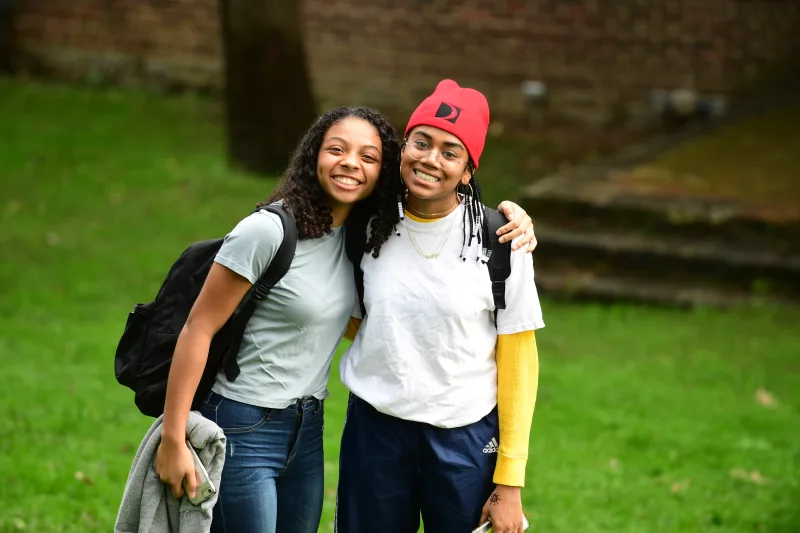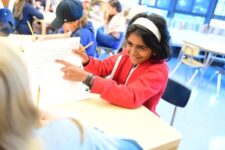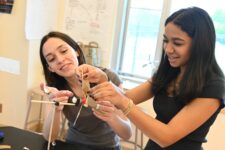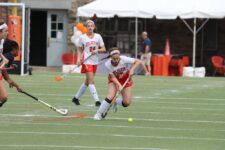We aim to promote collaboration and dialogue, both within and beyond the classroom walls. In challenging our students to relate their personal growth and achievements to the growth and achievements of others, we encourage them to see their inherent interdependence, within our own school community and beyond.
We start by showing genuine interest in the worlds from which our students come. Our students bring a diverse range of backgrounds to the classroom, and we encourage them to reflect on and celebrate the communities that have shaped who they are. Kindergarteners cover their neighborhoods as journalists, interviewing local personalities and business leaders. When they return to school to report on their findings, they have become active, engaged members of their community.
In Practice: Service Learning at ECFS
When it comes to service learning curriculum, a simple action in one grade can form the basis for meaningful work and reflection later on. Visit one of our lower divisions, and you may find our Pre-K students scurrying around the hallways, passing snacks to building maintenance, security, and other staff. When they are older, students make sandwiches for a local food kitchen and help to hand them out, learning about the people who visit the food kitchen and the many reasons someone might need a sandwich on a given day. Intentionally cultivating empathy is essential to our mission and serves as a curricular and co-curricular throughline, from service learning projects and peer-based advisory programs to national political activism.
One service learning project has become a much-anticipated part of the curriculum for Ethical Culture 4th Graders. The Spanish Book Project coincides with their Social Studies immigration study where the students create books for unaccompanied minors who are entering the United States — the book will be included in a welcome bag. Throughout the process, our students ask questions to ensure their books are culturally sensitive for their new friends.
Closer to home, our students learn how their education is connected to the education of others. Upper School students befriend and collaborate with peers whose educational experiences differ from their own. Collectively, students at the three schools work on community service projects and host discussions on issues like gun violence and race relations, establishing common ground.
We live as part of a community, and we recognize the responsibility each of us has to the whole. Our academic program is infused with the ideals of collaboration and care for others, rooted in mutual understanding and the promise of genuine relationships.
Case study: A year of social learning
Each student’s independence experience at ECFS is unique, distinguished in part by the classes they take, the extracurricular activities they pursue, and the teachers and peers they encounter. All of our students, however, are unified by their membership in our school’s community, which encourages them to help each other in their growth as much as it encourages them to engage with communities farther afield. A single year offers countless opportunities to interact with other students. Take a look at what one 4th Grader might do.
In their Social Studies unit on immigration at Ethical Culture, 4th Graders might partner with KIND, an organization that serves to protect children who enter the U.S. immigration system, to create audio books, city guides, and study materials that help immigrant families prepare for the civics questions on the citizenship test.
Or they might bond with their classmates while “roughing it” in the outdoors. As part of their study of colonial life, 4th Graders at Fieldston Lower spend an afternoon living as the pilgrims did, building a temporary settlement in the Ward Pound Ridge Reservation. Students gather food, construct a shelter, and map out the area, teaming up to ensure the sustainability of their mini-colony.
A 4th Grader might assume the role of teacher for a day. After learning about the three branches of government, the Constitution, and the Bill of Rights, the 4th Grade civics unit culminates with a creative project of the student’s choice. Students rotate through each other’s classrooms, learning from their peers as they share the material they have mastered.
Or they might end up teaching younger peers. As part of their lessons on the importance of reusing and recycling, Kindergarteners are paired with 4th Graders to build arcade games out of found objects. These collaborations form the basis of long-term mentoring relationships.
Frequently Asked Questions
How is interdependence practiced at ECFS?
Interdependence is actively practiced through collaborative learning, community engagement, and a focus on social-emotional development. As an independent thinking school, ECFS students learn to relate their own growth to the growth of others, fostering a sense of belonging and shared responsibility within the school community and beyond.
Why is interdependence a core tenet at ECFS?
At ECFS, we aim to promote collaboration and dialogue, both within and beyond the classroom walls. In challenging our students to relate their personal growth and achievements to the growth and achievements of others, we encourage them to see our inherent interdependence, both within our own school community and beyond. We live as part of a community, and we recognize the responsibility each of us has to the whole. Our academic program is infused with the ideals of collaboration and care for others, rooted in mutual understanding and the promise of genuine relationships.



